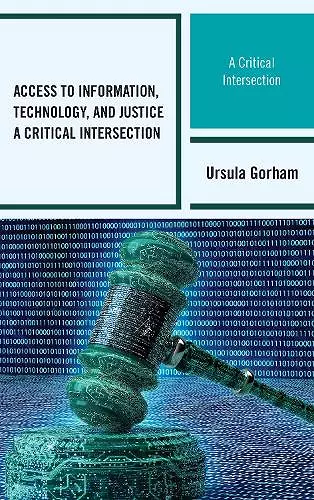Access to Information, Technology, and Justice
A Critical Intersection
Format:Hardback
Publisher:Bloomsbury Publishing PLC
Published:30th Jun '17
Currently unavailable, and unfortunately no date known when it will be back

Over the past fifteen years, the dramatic increase of online self-help legal re-sources, information, and tools specifically developed for use by low-income individuals without legal counsel has been promoted as one way to help those individuals who are caught in this “justice gap.” Unfortunately, however, opportunities arising from the Internet and related information and communication technologies do not accrue to everyone equally as physical, intellectual, and social barriers to information persist.
Access to Information, Technology, and Justice: A Critical Intersection, as the first ever book length examination of the use of technology to expand access to justice in the United States, highlights an emerging paradox wherein the technological transformation that has created an increasing array of legal self-help resources and services is also creating barriers to access for disadvantaged individuals. Those who cannot read, those who do not speak the English language, those who are unfamiliar with the law, and those with limited digital literacy skills all find themselves at a fundamental disadvantage. The legal community has only begun to examine whether these resources and services are, in fact, meeting the needs of struggling self-help users. This book builds upon existing work in this area by undertaking an in-depth exploration of how information and communication technologies are changing – and failing to change – the legal in-formation landscape for those who most need this information. Drawing upon the ongoing collaborative efforts of legal aid organizations, libraries, courts, and non-profit organizations, this book provides a framework for removing barriers to equitable access to legal information, with the ultimate goal of encouraging continued discussion and action.
This book provides a good introduction to the access to justice problems to anyone coming from an information perspective. It also provides a framework through which public-facing library services can be evaluated, regardless of the content of the services themselves. While scholarly in tone, this should be of interest to many librarians. Recommended for all libraries, particularly academic libraries, with public outreach missions or publicly accessible legal collections. * Technical Services Quarterly *
When librarians promote equity of access to information--especially for those marginalized in our communities, they often focus on such strategies as bridging the digital divide, serving the homeless, and providing resources to prisoners. But they often overlook another underserved population--those unable to afford access to justice, a growing number of people self-represented in civil cases. Ursula Gorham has written a timely call to action that covers much new ground at the intersection of access to information and access to justice, suitable for practitioners in both fields. Her book offers a historical and ethical perspective on the justice gap and then spells out the essential ingredients needed for public and law librarians, legal aid lawyers, law school clinics, and advocacy organizations to work together to close major gaps in access to justice in the digital age. Access to Information, Technology, and Justice: A Critical Intersection is an eye opener for those wishing to understand the multitude of barriers facing today’s citizens who are ill-prepared to navigate the opaque worlds of do-it-yourself justice, e-government, and 21st century literacies. -- Nancy Kranich, Lecturer, Rutgers University School of Communication and Information and Past President, American Library Association
Access to Information, Technology, and Justice is a comprehensive and engaging analysis of the development of online legal resources for individuals facing legal issues on their own, and the collaborations that gave rise to these efforts. Ms. Gorham embraces information access as an issue of social justice, and calls for additional research exploring the critical intersection of equitable access to information and equal justice. At a moment when access to civil legal assistance is more important than ever and emerging technology offers new and powerful ways to overcome justice gaps, this book provides essential historical context and identifies factors that can contribute to the success of innovations in online legal resources and self-help tools in the future.” -- Liz Keith, Program Director, Pro Bono Net
Access to justice is, without a doubt, a very important concern in modern societies, particularly when referring to historically disadvantaged groups. This book takes an in-depth approach and is able to produce powerful insights related to social justice and information access, but also important practical implications. Based on increased engagement with legal information websites, libraries and other community-based organizations, Access to Information, Technology, and Justice: A Critical Intersection proposes ways to start closing the justice gap by significantly enhancing legal self-help services through physical, intellectual, and social access to relevant information and, therefore, I highly recommend it. -- J. Ramon Gil-Garcia, Associate Professor of Public Administration and Policy and the Research Director of the Center for Technology in Government, University at Albany, State University of New York (SUNY)
ISBN: 9781442270299
Dimensions: 239mm x 160mm x 19mm
Weight: 431g
166 pages